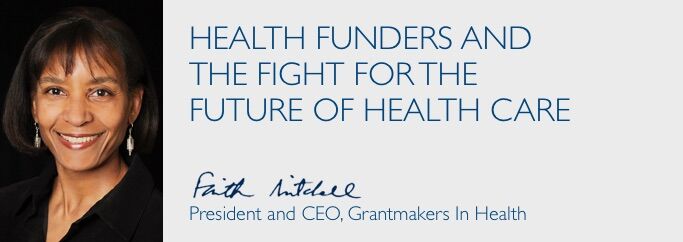
As part of our 35th anniversary celebration, we reached out to GIH board members and board alumni to share their advice to health funders about the primary challenges that philanthropy should be tackling. As described in my July letter, several pointed out the contributions health funders have made—and can continue to make—to policy change. Many who have worked on policy focused specifically on the importance of health funders remaining engaged in efforts to improve the health care system. As Margaret O’Bryon observed, “There is currently a huge opportunity for funders to be leaders of a movement with its roots in social justice—a movement with great urgency.”
As the board members’ responses indicate, funders can exercise leadership not only by defending the coverage of Americans who risk losing it, but also by leaning into the issues of costs, financing, and delivery system reform.
- “Health funders need to be laser focused on health care reform (again!). Unfortunately, many funders stopped working on health reform as soon as the legislation was signed, but a continued public media campaign as well as continued policy engagement (especially at the state levels) was vitally important and in many cases was missing. Funders need to regather to stop the repeal of the Affordable Care Act (ACA) and to fight for universal coverage.”
- “Top issues for health funders include: 1) the future of the ACA; 2) the future of Medicaid and health care for low income Americans; and 3) health care delivery reform and its impact on access and costs.”
- “Health funders should respond to the needs of populations who are most impacted by changes to, or repeal of, the ACA. What can funders do to mitigate this damage?”
- “Funders must develop a joint strategy and response regarding the ACA and the future of health care for low-and moderate-income uninsured people across the country. Key elements of that strategy might include: 1) funding advocacy and policy groups who gather and share stories, the facts, and data; 2) funding research to build the case for an equitable health care system; and 3) staying on top of the conversations and changes being explored by policymakers related to the future of the health care system.”
- “The inescapable reality is that the difficulties faced by families, employers, and even government in paying for care are consequences of its enormous cost, compounded by the tremendous waste in our delivery system. The fight to defend coverage has always been easier for foundations than the trickier issue of taking on entrenched culture and interests to make the delivery of care more efficient and effective. However, it’s important to fight on both fronts: defending coverage, but also addressing the cost issue that puts coverage out of reach for so many Americans.”
- “Despite threats to repeal and replace the ACA, the health system will continue on a path toward value and value-based purchasing. Funders will need to be even more engaged on this to move this forward.”
Capturing the importance of the current moment, Brenda Sharpe said, “Health funders are in a unique position to monitor, critique, and advance health policy that affects all Americans. When we act together, we can have substantive impact. When we are silent, we allow our health care system and the health of America to erode.”
In upcoming letters, I will share the insights and recommendations of GIH board members and alumni on additional areas of work, including workforce education and clinical care, the social determinants of health, health equity, and health funders as social justice leaders.

